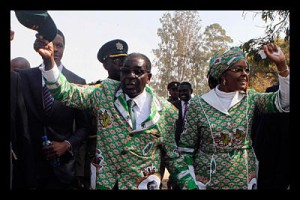Update on Elections in Zimbabwe

On July 31, 2013, elections in Zimbabwe took place for both the parliament and presidency. The election was the first under the southern African country’s new constitution. The current 89-year-old leader, Robert Mugabe, transformed the country once known as the breadbasket of Africa into an African basket case. He hopes to extend his 33-year-long reign of power, but he has serious competition from Prime Minister Morgan Tsvangirai.
But Tsvangirai may not be the answer to the country’s problems. He has committed many strategic errors, fracturing the opposition movement in the struggle against his opponent. He is a man who has survived multiple alleged assassination attempts in defense of freedom and democracy, and has suffered jail time and torture. Tsvangirai also understands the country’s need for economic freedom. He is aware that in order for Zimbabwe to prosper, the government needs to restore respect for property rights, shut down inefficient state-run enterprises, and significantly improve the business environment.
Zimbabwe experienced extreme economic hardship between 1998 and 2008. Its economy contracted at an annual rate of -6.09%. However, the countries next door, Botswana and Mozambique, were growing at annual rates of 3.95% and 4.94%, respectively. Zimbabwe’s per capita income fell dramatically from $1,640 to $661 while incomes in the neighboring countries continued to increase. As a result of economic contraction, Zimbabwe’s unemployment rate rose to nearly 94% in 2008.
Though the country rebounded slightly from the low point in 2008, its economy was still 36% smaller in 2012 than it had been in 1998. The UN’s Human Development Index (HDI) – an approximate measure of a standard of living that is calculated on a scale from 0 to 1 – saw Zimbabwe fall from 0.376 in 2000 to 0.345 in 2008. The cholera outbreak that left hundreds dead was merely a confirmation that Zimbabwe was a failed country.
In 2010, Zimbabwe ranked 142nd out of 144 countries surveyed in the Fraser Institute’s Economics Freedom of the World report; this year, it came in 172nd out of 185 countries surveyed in the World Bank’s Doing Business report; and 132nd out of 144 countries surveyed by the World Economic Forum’s Global Competitiveness Report.
The underlying cause of the country’s economic turmoil, past and present, is political action. Robert Mugabe became prime minister and then president in 1980. He was a professed communist who was committed to turning Zimbabwe into a one-party Marxist state. After defeating the white-minority rule in the country that was once called Rhodesia, Mugabe saw himself as the supreme leader, and his party, the Zimbabwe African National Union (ZANU), as the only legitimate political authority in the country.
Joshua Nkomo and his African People’s Union party (ZAPU) were Mugabe’s opposition. During the 1983 elections, Mugabe released the Zimbabwean military on Nkomo’s supporters. Over 20,000 people perished in that conflict. Eventually ZAPU was forced to merge with ZANU, and Nkomo became Mugabe’s powerless Vice President.
According to Foreign Policy Magazine, what Zimbabwe desperately needs are structural reforms including tax simplifications, labor and product market deregulation, and privatization of money-losing state-owned enterprises. Above all else, Zimbabweans must find a way to restore the rule of law and respect for property rights. For decades, Zimbabwe’s multiple communist regimes have benefitted from government monopolies, sale of permits and licenses, and outright fraud and theft. And the majority of Zimbabweans have been suffering. Only a clean break from the past will put the country on the right track to a sustained rate of high economic growth.
The election took place on Wednesday and the Zimbabwean Electoral Commission has 5 days to release the results. Already Mugabe’s party is claiming a victory for their side and Tsvangirai’s party is claiming that there has been election fraud.
– Scarlet Shelton
Sources: Sky News, Fraser Institute, Doing Business, World Economic Forum
